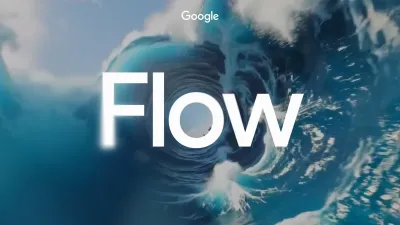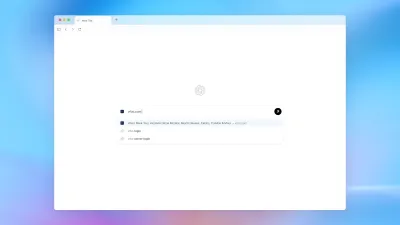Google's Flow AI Video Generator Unleashes Advanced Editing and Audio, Redefining Realism
By: @devadigax

Google is taking a significant leap forward in the realm of artificial intelligence-powered video generation, announcing substantial enhancements to its AI filmmaking tool, Flow. The company revealed on Wednesday that these updates will allow users to achieve unprecedented levels of realism and control, making AI-generated videos not only more sophisticated but also increasingly challenging to distinguish from live-action footage at first glance. The core of these improvements lies in advanced editing capabilities, particularly in manipulating shadows and lighting, coupled with more refined audio features.
The introduction of granular control over shadows and lighting is a game-changer for AI video generation. Historically, one of the tell-tale signs of AI-generated content has been a subtle lack of environmental coherence—objects might appear flat, or lighting might not react naturally to their surroundings. By empowering users to add, subtract, and modify shadows and light sources within their AI videos, Google's Flow is addressing a critical component of visual authenticity. This capability allows creators to sculpt the mood, depth, and overall realism of their scenes, mimicking the intricate work of a professional cinematographer or lighting designer without the need for complex 3D rendering software or physical sets.
Beyond visual fidelity, the enhancements also extend to audio, a crucial yet often overlooked element in immersive video experiences. While the specifics of the "more audio" improvements weren't fully detailed in the initial announcement, it strongly suggests advancements in sound design, voice synthesis integration, and potentially even ambient sound generation that dynamically adapts to the visual content. Realistic audio, perfectly synchronized and contextually appropriate, is paramount for suspending disbelief and creating truly engaging narratives. The combination of hyper-realistic visuals and compelling audio elevates Flow from a novelty to a formidable creative instrument.
These advancements position Google's Flow as a serious contender in the rapidly evolving AI video landscape, which has seen fierce competition from players like OpenAI's Sora, RunwayML, and Pika Labs. While Sora captivated the world with its stunningly realistic, minute-long clips, Google appears to be focusing on giving creators more direct, granular control over the generated output. This shift from mere generation to sophisticated editing within the AI framework is crucial for professional applications, allowing artists, marketers, and filmmakers to fine-tune their visions with precision previously only possible with traditional production methods.
The implications of such powerful AI video tools are profound and multifaceted. On one hand, they promise to democratize filmmaking, making high-quality video production accessible to individuals and small teams without massive budgets or specialized equipment. Content creators can rapidly prototype ideas, generate complex scenes, or even produce entire short films with unprecedented speed and efficiency. This could unleash a wave of creativity, enabling diverse voices to tell their stories without the traditional barriers to entry. For industries like marketing and advertising, it means faster campaign turnarounds and highly customized visual content.
However, the very feature that makes Flow so impressive—its ability to create videos "harder to identify as AI-generated at first glance"—raises significant ethical and societal concerns. As AI-generated content becomes indistinguishable from reality, the potential for misinformation, deepfakes, and the erosion of trust in visual media grows exponentially. The ability to manipulate lighting and shadows could be used to alter contexts, change perceptions, or fabricate events with a level of believability that is deeply troubling. This necessitates a proactive approach from Google and the wider AI community to develop robust detection mechanisms, transparent watermarking, and clear ethical guidelines for the responsible use of such technology.
Google's continued investment in AI tools like Flow underscores its commitment to leading the charge in generative AI. These systems leverage complex neural networks, often based on diffusion models and transformer architectures, which have been trained on vast datasets of images and videos. This training allows the AI to understand the intricate relationships between light, shadow, texture, and motion, and then synthesize new content that adheres to these learned principles. The ability to manipulate these elements in real-time or near real-time represents a significant leap in the AI's understanding and control over the visual world.
Looking ahead, the trajectory of AI video generation points towards even greater sophistication. We can anticipate longer, more coherent video generations, multi-modal inputs that allow for text, image, and audio prompts simultaneously, and seamless integration with other AI tools for scriptwriting, voice acting, and even emotional resonance analysis. The race is on not just for realism, but for creative control, narrative complexity, and the ability to translate abstract ideas into tangible, believable visual stories. Google's latest updates to Flow are a clear signal that the future of filmmaking will be inextricably linked with artificial intelligence, presenting both immense opportunities and significant responsibilities.
The introduction of granular control over shadows and lighting is a game-changer for AI video generation. Historically, one of the tell-tale signs of AI-generated content has been a subtle lack of environmental coherence—objects might appear flat, or lighting might not react naturally to their surroundings. By empowering users to add, subtract, and modify shadows and light sources within their AI videos, Google's Flow is addressing a critical component of visual authenticity. This capability allows creators to sculpt the mood, depth, and overall realism of their scenes, mimicking the intricate work of a professional cinematographer or lighting designer without the need for complex 3D rendering software or physical sets.
Beyond visual fidelity, the enhancements also extend to audio, a crucial yet often overlooked element in immersive video experiences. While the specifics of the "more audio" improvements weren't fully detailed in the initial announcement, it strongly suggests advancements in sound design, voice synthesis integration, and potentially even ambient sound generation that dynamically adapts to the visual content. Realistic audio, perfectly synchronized and contextually appropriate, is paramount for suspending disbelief and creating truly engaging narratives. The combination of hyper-realistic visuals and compelling audio elevates Flow from a novelty to a formidable creative instrument.
These advancements position Google's Flow as a serious contender in the rapidly evolving AI video landscape, which has seen fierce competition from players like OpenAI's Sora, RunwayML, and Pika Labs. While Sora captivated the world with its stunningly realistic, minute-long clips, Google appears to be focusing on giving creators more direct, granular control over the generated output. This shift from mere generation to sophisticated editing within the AI framework is crucial for professional applications, allowing artists, marketers, and filmmakers to fine-tune their visions with precision previously only possible with traditional production methods.
The implications of such powerful AI video tools are profound and multifaceted. On one hand, they promise to democratize filmmaking, making high-quality video production accessible to individuals and small teams without massive budgets or specialized equipment. Content creators can rapidly prototype ideas, generate complex scenes, or even produce entire short films with unprecedented speed and efficiency. This could unleash a wave of creativity, enabling diverse voices to tell their stories without the traditional barriers to entry. For industries like marketing and advertising, it means faster campaign turnarounds and highly customized visual content.
However, the very feature that makes Flow so impressive—its ability to create videos "harder to identify as AI-generated at first glance"—raises significant ethical and societal concerns. As AI-generated content becomes indistinguishable from reality, the potential for misinformation, deepfakes, and the erosion of trust in visual media grows exponentially. The ability to manipulate lighting and shadows could be used to alter contexts, change perceptions, or fabricate events with a level of believability that is deeply troubling. This necessitates a proactive approach from Google and the wider AI community to develop robust detection mechanisms, transparent watermarking, and clear ethical guidelines for the responsible use of such technology.
Google's continued investment in AI tools like Flow underscores its commitment to leading the charge in generative AI. These systems leverage complex neural networks, often based on diffusion models and transformer architectures, which have been trained on vast datasets of images and videos. This training allows the AI to understand the intricate relationships between light, shadow, texture, and motion, and then synthesize new content that adheres to these learned principles. The ability to manipulate these elements in real-time or near real-time represents a significant leap in the AI's understanding and control over the visual world.
Looking ahead, the trajectory of AI video generation points towards even greater sophistication. We can anticipate longer, more coherent video generations, multi-modal inputs that allow for text, image, and audio prompts simultaneously, and seamless integration with other AI tools for scriptwriting, voice acting, and even emotional resonance analysis. The race is on not just for realism, but for creative control, narrative complexity, and the ability to translate abstract ideas into tangible, believable visual stories. Google's latest updates to Flow are a clear signal that the future of filmmaking will be inextricably linked with artificial intelligence, presenting both immense opportunities and significant responsibilities.
Comments
Related News

Doubling Down on AI: Mozilla's New CEO Charts a Transformative Path for Firefox
Mozilla, a name long synonymous with an open internet and user empowerment, finds itself at a pivotal juncture. With a new CEO ...
@devadigax | 16 Dec 2025
Mozilla, a name long synonymous with an open internet and user empowerment, finds itself at a pivotal juncture. With a new CEO ...
@devadigax | 16 Dec 2025

OpenAI Unveils ChatGPT Atlas: Your Browser Just Became Your Smartest AI Assistant
In a move poised to fundamentally reshape how we interact with the internet, OpenAI has officially launched ChatGPT Atlas, a gr...
@devadigax | 22 Oct 2025
In a move poised to fundamentally reshape how we interact with the internet, OpenAI has officially launched ChatGPT Atlas, a gr...
@devadigax | 22 Oct 2025

Netflix Doubles Down on Generative AI, Challenging Hollywood's Divide Over Creative Futures
In a move that underscores a growing chasm within the entertainment industry, streaming giant Netflix is reportedly going "all ...
@devadigax | 21 Oct 2025
In a move that underscores a growing chasm within the entertainment industry, streaming giant Netflix is reportedly going "all ...
@devadigax | 21 Oct 2025

AI Agent Pioneer LangChain Achieves Unicorn Status with $1.25 Billion Valuation
LangChain, the innovative open-source framework at the forefront of building AI agents, has officially joined the exclusive clu...
@devadigax | 21 Oct 2025
LangChain, the innovative open-source framework at the forefront of building AI agents, has officially joined the exclusive clu...
@devadigax | 21 Oct 2025

Meta Boots ChatGPT From WhatsApp: A Strategic Play for AI Dominance and Walled Gardens
In a significant move that reshapes the landscape of AI chatbot accessibility, OpenAI has officially confirmed that its popular...
@devadigax | 21 Oct 2025
In a significant move that reshapes the landscape of AI chatbot accessibility, OpenAI has officially confirmed that its popular...
@devadigax | 21 Oct 2025
 AI Tool Buzz
AI Tool Buzz